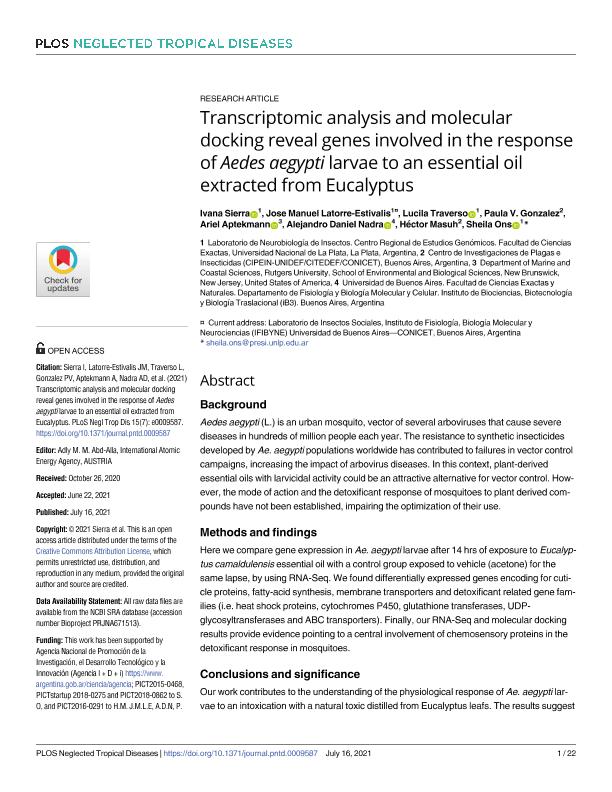Artículo
Transcriptomic analysis and molecular docking reveal genes involved in the response of Aedes aegypti larvae to an essential oil extracted from Eucalyptus
Sierra, Ivana Samanta ; Latorre Estivalis, Jose Manuel
; Latorre Estivalis, Jose Manuel ; Traverso, Lucila María
; Traverso, Lucila María ; Gonzalez, Paula Valeria
; Gonzalez, Paula Valeria ; Aptekmann, Ariel
; Aptekmann, Ariel ; Nadra, Alejandro Daniel
; Nadra, Alejandro Daniel ; Masuh, Hector Mario
; Masuh, Hector Mario ; Ons, Sheila
; Ons, Sheila
 ; Latorre Estivalis, Jose Manuel
; Latorre Estivalis, Jose Manuel ; Traverso, Lucila María
; Traverso, Lucila María ; Gonzalez, Paula Valeria
; Gonzalez, Paula Valeria ; Aptekmann, Ariel
; Aptekmann, Ariel ; Nadra, Alejandro Daniel
; Nadra, Alejandro Daniel ; Masuh, Hector Mario
; Masuh, Hector Mario ; Ons, Sheila
; Ons, Sheila
Fecha de publicación:
07/2021
Editorial:
Public Library of Science
Revista:
Neglected Tropical Diseases
ISSN:
1935-2727
e-ISSN:
1935-2735
Idioma:
Inglés
Tipo de recurso:
Artículo publicado
Clasificación temática:
Resumen
Background: Aedes aegypti (L.) is an urban mosquito, vector of several arboviruses that cause severe diseases in hundreds of million people each year. The resistance to synthetic insecticides developed by Ae. aegypti populations worldwide has contributed to failures in vector control campaigns, increasing the impact of arbovirus diseases. In this context, plant-derived essential oils with larvicidal activity could be an attractive alternative for vector control. However, the mode of action and the detoxificant response of mosquitoes to plant derived compounds have not been established, impairing the optimization of their use. Methods and findings: Here we compare gene expression in Ae. aegypti larvae after 14 hrs of exposure to Eucalyptus camaldulensis essential oil with a control group exposed to vehicle (acetone) for the same lapse, by using RNA-Seq. We found differentially expressed genes encoding for cuticle proteins, fatty-acid synthesis, membrane transporters and detoxificant related gene families (i.e. heat shock proteins, cytochromes P450, glutathione transferases, UDP-glycosyltransferases and ABC transporters). Finally, our RNA-Seq and molecular docking results provide evidence pointing to a central involvement of chemosensory proteins in the detoxificant response in mosquitoes. Conclusions and significance: Our work contributes to the understanding of the physiological response of Ae. aegypti larvae to an intoxication with a natural toxic distilled from Eucalyptus leafs. The results suggest an involvement of most of the gene families associated to detoxification of xenobiotics in insects. Noteworthy, this work provides important information regarding the implication of chemosensory proteins in the detoxification of a natural larvicide. Understanding the mode of detoxification of Eucalyptus distilled compounds could contribute to their implementation as a tool in mosquito control.
Palabras clave:
AEDES AEGYPTI
,
ESSENTIAL OIL
,
EUCALYPTUS
Archivos asociados
Licencia
Identificadores
Colecciones
Articulos(OCA CIUDAD UNIVERSITARIA)
Articulos de OFICINA DE COORDINACION ADMINISTRATIVA CIUDAD UNIVERSITARIA
Articulos de OFICINA DE COORDINACION ADMINISTRATIVA CIUDAD UNIVERSITARIA
Citación
Sierra, Ivana Samanta; Latorre Estivalis, Jose Manuel; Traverso, Lucila María; Gonzalez, Paula Valeria; Aptekmann, Ariel; et al.; Transcriptomic analysis and molecular docking reveal genes involved in the response of Aedes aegypti larvae to an essential oil extracted from Eucalyptus; Public Library of Science; Neglected Tropical Diseases; 15; 7; 7-2021; 1-22
Compartir
Altmétricas



